The birthday of my life, was come, was come to me.
My Birthday!

Every birthday, not just the one special marking a new decade and all of them are special as the milestones. Every year brings its 365 life lessons. We turn not older with years, but newer every day. So, last month I reached a point where I asked myself about why we even bother to celebrate birthdays?
 I am not really big on major birthday gatherings. Many people who love you will try to celebrate your birthday, but no one can celebrate your birthday exactly the way you need for. This because no one really knows you need this day.
I am not really big on major birthday gatherings. Many people who love you will try to celebrate your birthday, but no one can celebrate your birthday exactly the way you need for. This because no one really knows you need this day.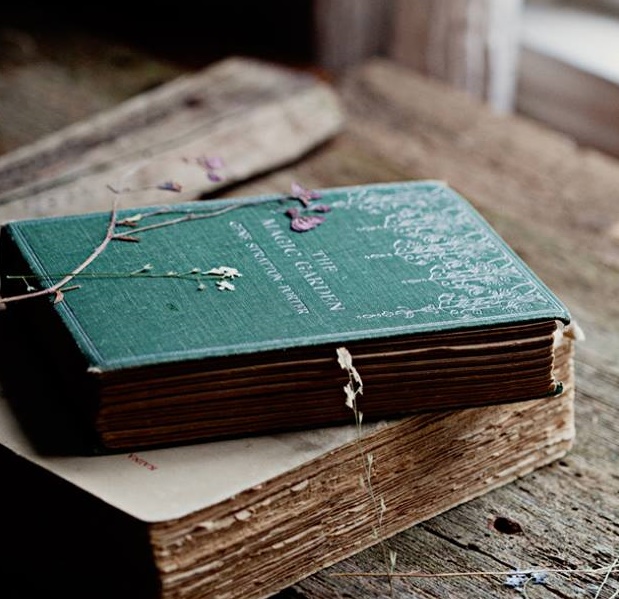
The ancient Greeks believed that each person had a spirit that attended his or her birth, and kept watch. The Greeks most likely took the idea of birthday celebration from the Egyptians, since just like the celebration of the pharaohs as “gods,” the Greeks were celebrating their gods and goddesses. They offered moon-shaped cakes to Artemis, as a form of tribute to the lunar goddess. To recreate the radiance of the moon and her perceived beauty, Greeks lit candles and put them on cakes for a glowing effect. The lit candles symbolized the moon’s glowing light. Ancient Romans were the first to celebrate birthdays for the common man (but just the men). The prevailing opinion seems to be that the Romans were the first civilization to celebrate birthdays for non-religious figures. Romans would celebrate birthdays for friends and families, while the government created public holidays to observe the birthdays of more famous citizens. Those celebrating a 50th birthday party would receive a special cake made of wheat flour, olive oil, honey and grated cheese.
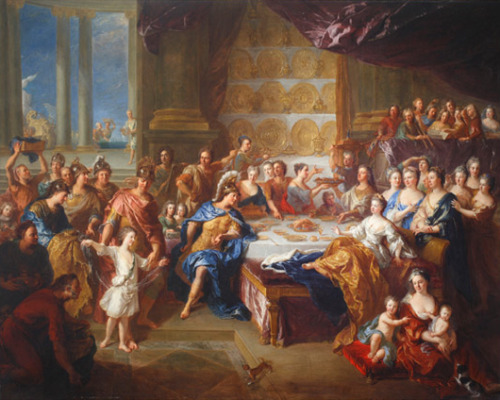 Sad to say but female birthdays still weren’t celebrated until around the 12th century. And as if this were not enough, Christians initially considered birthdays to be a pagan ritual. In the past, they didn’t celebrate birthdays historically, because of that link to paganism. Pagans thought that evil spirits lurked on days of major changes, like the day you turn a year older. Due to its belief that humans are born with “original sin” and the fact that early birthdays were tied to “pagan” gods, the Christian Church considered birthday celebrations evil for the first few hundred years of its existence. Around the 4th century, Christians changed their minds and began to celebrate the birthday of Jesus as the holiday of Christmas. This new celebration was accepted into the church partly in hopes of recruiting those already celebrating the Roman holiday of Saturnalia.
Sad to say but female birthdays still weren’t celebrated until around the 12th century. And as if this were not enough, Christians initially considered birthdays to be a pagan ritual. In the past, they didn’t celebrate birthdays historically, because of that link to paganism. Pagans thought that evil spirits lurked on days of major changes, like the day you turn a year older. Due to its belief that humans are born with “original sin” and the fact that early birthdays were tied to “pagan” gods, the Christian Church considered birthday celebrations evil for the first few hundred years of its existence. Around the 4th century, Christians changed their minds and began to celebrate the birthday of Jesus as the holiday of Christmas. This new celebration was accepted into the church partly in hopes of recruiting those already celebrating the Roman holiday of Saturnalia. 
Although the general idea of celebrating birthdays had already started taking off around the world — like in China, where a child’s first birthday was specifically honoured. Eating long noodles or “Mee” which signify a long life. Eating and passing out red dyed eggs to symbolize happiness and the renewal of life.
There is evidence of the use of candles on cakes at birthday celebrations in 18th Century Germany. This version of the tradition can be traced to Kinderfest (Kinder is the German word for ‘children’), a birthday celebration for children. This celebration was held for children and involved both birthday cake and candles. Kids got one candle for each year they’d been alive, plus another to symbolize the hope of living for at least one more year. and making a wish was also a part of these celebrations.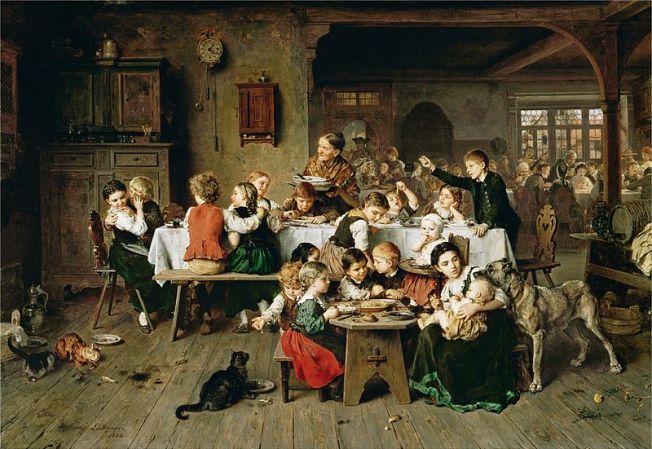 The Industrial Revolution brought delicious cakes to the masses. For quite some time, birthday celebrations involving sugary cakes were only available to the very wealthy, as the necessary ingredients were considered a luxury.
The Industrial Revolution brought delicious cakes to the masses. For quite some time, birthday celebrations involving sugary cakes were only available to the very wealthy, as the necessary ingredients were considered a luxury.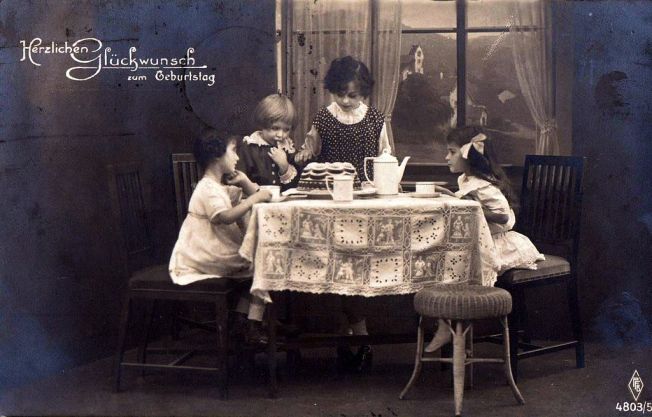

We need to remember that Glasgow had been refining sugar since the 1660’s, and so much of what was brought ashore at Greenock and Port Glasgow was shipped up the river by cart. However, the first commercial refinery was not established in Greenock. It was built by Mr Mark Kuhl and employed just a handful of men. At this time, there was no town in the Empire, outside of London, carrying out the trade so extensively and Greenock rightfully earned the title of Sugaropolis, the sugar capital of Scotland.
But the industrial revolution allowed celebrations like kinderfest and the subsequent equivalents in other cultures to proliferate. Not only did the required ingredients become more abundant, but bakeries also started offering pre-made cakes at lower prices due to advances in mass production, such as the scene above capturing workers of one of the many Cadby Hall bakeries of the late 19th century.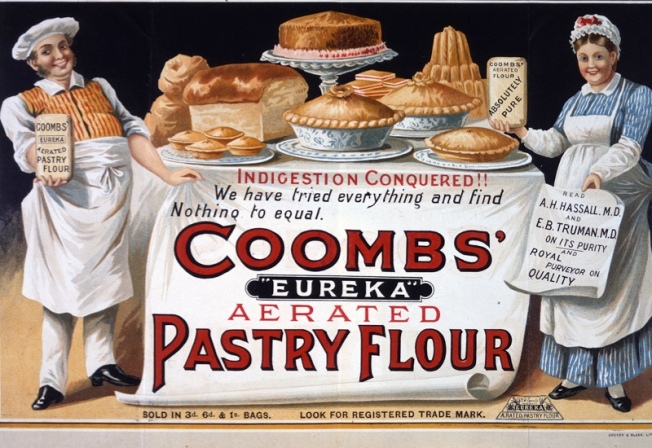 Meanwhile, the introduction of baking powder saw the style of cakes change from dense, yeast-based bakes, into cakes made with flour, eggs, fat and a raising agent and the advent of baking powder sees cakes become lighter. Probably the most popular in 19 century was a just traditional fruitcake.
Meanwhile, the introduction of baking powder saw the style of cakes change from dense, yeast-based bakes, into cakes made with flour, eggs, fat and a raising agent and the advent of baking powder sees cakes become lighter. Probably the most popular in 19 century was a just traditional fruitcake.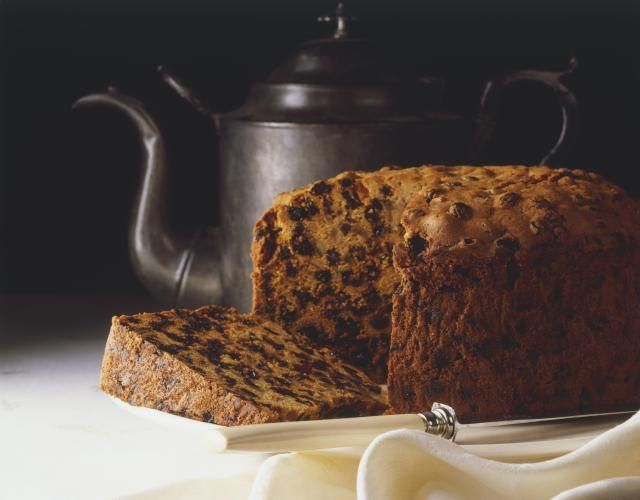 Also, it’s unclear who change the words of the song “Good Morning To All,” to the words of “Happy Birthday To You.”
Also, it’s unclear who change the words of the song “Good Morning To All,” to the words of “Happy Birthday To You.”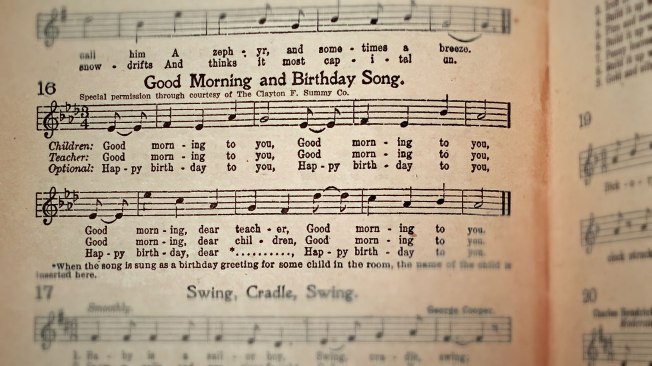 Yes, famous The Birthday Song is a remix, kind of. In 1893, Patty Hill and Mildred J. Hill wrote a song they called, “Good Morning To All,” which was intended to be sung by students before classes began. The song eventually caught on across America, giving rise to a number of variations. Robert Coleman eventually published a songbook in 1924, adding a few extra lyrics that would quickly come to overshadow the original lines. The new rendition became the version we now all know, “Happy Birthday To You.”
Yes, famous The Birthday Song is a remix, kind of. In 1893, Patty Hill and Mildred J. Hill wrote a song they called, “Good Morning To All,” which was intended to be sung by students before classes began. The song eventually caught on across America, giving rise to a number of variations. Robert Coleman eventually published a songbook in 1924, adding a few extra lyrics that would quickly come to overshadow the original lines. The new rendition became the version we now all know, “Happy Birthday To You.”
So, Today it might be your birthday.
If it is
Happy Birthday!
Laugh more often
Stop trying to please everybody
Start pleasing yourself
Don’t worry be happy
Cherish your dreams
Express love every day
Search for authentic self until you find her
Breath deeply and often
Move, walk, dance, run…….
Happy Birthday to you!
🙂
Ella